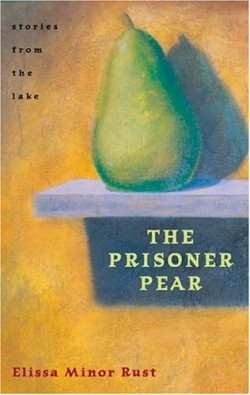The Prisoner Pear
Mixed with an equal measure of Norman Rockwell and Picasso, an added dollop of suburbiana, a dash of dissociative ennui, and a heroic search for meaning, these twelve stories elucidate the range of typical psycho-dramas being played out in affluent neighborhoods throughout an existentially abstracted post-9/11 America. The characters range from familiar denizens of the local malls such as an anorexic teenager struggling toward health to a husband who seeks solace with his infant daughter following his wife’s post-partum desertion.
While most of the stories rely on conventional narrative devices and prose style to tell the stories of rather conventional people lost in conventional dilemmas, some of the stories, such as “Moon over Water” and “Vital Organs,” utilize magical realism to cast the characters’ commonplace situations in a surrealistically revealing light, ultimately pointing out that many of these dramas are like a “small trivial act in the light of the real tragedy people are facing on the other side of the country.”
The author’s genius in stories such as “Raccoons,” “God and Birds,” and “Crabwise” is her ability to sustain the readers’ sympathy for characters who hope to imagine themselves “a part of some silly urban legend” while in reality what they experience looks like “your garden-variety anxiety attack.” As Minor Rust’s characters—youth yearning for attachment, married couples floundering in static isolation—are neighbors the reader recognizes, the guilt, envy, boredom, frustration, small humiliations, and moments of petty revenge she exposes strike close to home. The Prisoner Pear offers characters that, while “unoriginal,” are living lives “on the edge of something utterly beyond [their] control.”
Recipient of the Peregrine Prize, The Honolulu Fiction Prize, and an Oregon Literary Arts Fellowship, Minor Rust lives outside Portland, Oregon and has had stories published in many small press literary magazines. Her stories, delivered with a composed ironical narrative voice, reveal a contemporary world in which characters witness “the moments when things become past tense.” The Prisoner Pear renders this particular world so well that the collection, like the bird’s skull in “The Weight of Bones,” becomes “a mystery, a permanent thing” that creates “an almost tangible place inside [the] head.”
While the first-person narrator of “Moon over Water” thinks, “We are a silly, silly people,” Minor Rust’s compassion for her characters lifts these predictable lives from the mundane and creates stories and characters in which “their play is always a magnificent cure.”
Reviewed by
Duncan Sprattmoran
Disclosure: This article is not an endorsement, but a review. The publisher of this book provided free copies of the book to have their book reviewed by a professional reviewer. No fee was paid by the publisher for this review. Foreword Reviews only recommends books that we love. Foreword Magazine, Inc. is disclosing this in accordance with the Federal Trade Commission’s 16 CFR, Part 255.

